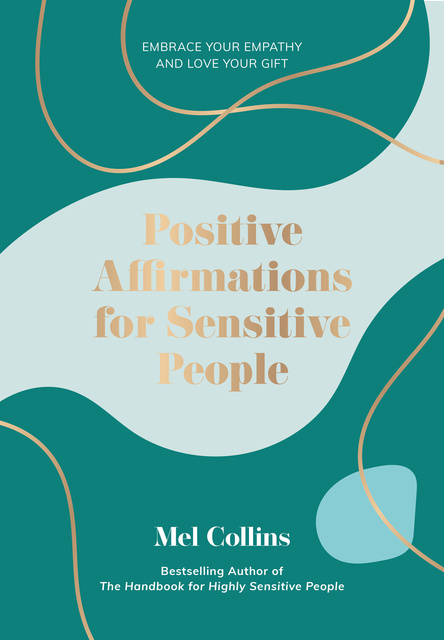7 positive affirmations for preventing overwhelm
Do you often feel overwhelmed? Mel Collins explores how positive affirmations could help...

If you’ve spent much of your life being told you’re ‘too sensitive’, and frequently feel on the edge of burnout, it’s possible you’re one of the 1.4 billion people globally who are born with the trait of high sensitivity. Luckily, positive affirmations can be a highly effective tool to help.
Being a Highly Sensitive Person (HSP) can be overwhelming. But knowing about this trait, and understanding how to manage certain aspects of it, can really help HSPs to not only feel less overwhelmed in this non-sensitive world, but to thrive in it.

What is high sensitivity?
One in five people are born with the characteristic of high sensitivity. This innate temperament trait is also known as sensory processing sensitivity, because of the depth of sensory, environmental and information processing that happens within the biological nervous systems and brains of HSPs.
So, what does all this mean? HSPs experience their emotions more deeply than non-HSPs, and they process them for longer. They are more reactive on an emotional level to events in their life or to the positive and negative emotions of others.
They can also pick up on subtleties that others are not aware of, and they can get affected by environmental and sensory stimuli that others don’t notice or are simply not bothered by. Too much noise, alarms constantly going off, or doing too many things at once, for example, can lead to over-stimulation in the sensory nervous system, which can lead to HSPs feeling overwhelmed.
Signs you might be a Highly Sensitive Person (HSP):
- People often tell you that you’re ‘too sensitive’ or that you need to ‘toughen up’.
- You are highly reflective or a deep thinker.
- You are deeply compassionate and extremely intuitive.
- When in a crowd or around negative people, you often feel overwhelmed and like you need to withdraw.
- You are highly empathic, but you tend to absorb other people’s stuff like a sponge, which leaves you feeling weighed down or saturated.
- You can end up feeling frazzled if you don’t get any quiet time alone, or if you can’t spend time in nature.
- If you are being observed, taking a test or speaking in public, you don’t perform as well.
- You give great attention to detail or could be considered a perfectionist.
- Your dislike of confrontation leads you to deliberately avoid upsetting situations.
- You tend to overanalyse things or struggle to switch your mind off.

Do you struggle to accept criticism?
It’s not just sensory or environmental sensitivities that can affect HSPs. Judgements, criticisms or mocking from other people about being ‘overly’ or ‘hyper’ sensitive can make HSPs think that there is something ‘wrong’ with them. Many end up adapting themselves or wearing a ‘false mask’ to try to fit in. This ultimately leads to more over-stimulation in their sensory nervous system.
These hurtful comments not only get internalised and start to eat away at their self-worth, but they also often form the foundation of negative thoughts or beliefs that HSPs start to think about themselves or their sensitivity. But sensitivity isn’t a weakness or a flaw – it’s a gift and a strength.
Once HSPs embrace the beautiful gifts and abilities associated with their trait, and learn how to manage particular facets of it, they can start to feel more empowered and live more authentically and harmoniously.
And by practising various self-help strategies, HSPs can discover how to prevent or manage the overarousal that leads to overwhelm. One of the simplest ways to do this is to use positive affirmations in a daily self-care practice.
What are positive affirmations?
Affirmations are just positive statements that are repeated often, to challenge negative or unhelpful thoughts, beliefs or self-talk. With regular daily practice (several times a day, for a minimum of 21 days), a person can make lasting changes to the way they think and feel.
Through repetition, the affirmations embed into the subconscious mind. Eventually, the negative beliefs fade, and the new positive ones become more believable and authentic. As a result, this changes the way a person thinks and feels about themself, which in turn increases self-love, self-acceptance and self-confidence.

How to use positive affirmations
You can either repeat an affirmation in your head or say it out loud. Many people find that vocalising the phrase gives power to the words.
Others find that looking in a mirror while saying the affirmation makes a difference to how effective the affirmation feels. Affirmations can also be used as a mantra in meditation or whilst practising yoga, for example.
7 positive affirmations for managing or preventing overwhelm
Try repeating the following affirmations to yourself every day until you truly begin to believe them and implement their values into your life. You could recite all of them, or just pick one or two that resonate with you.
1. I am listening to my body because it always lets me know when I need to rest and relax.
Many HSPs ignore their body’s signals of over-stimulation. As a result, their adrenal glands and sympathetic nervous system gets activated and their ‘fight, flight or freeze’ response kicks in and they start to feel frazzled or overwhelmed.
This can be prevented by learning to listen to your body and reducing the over-stimulation before over-arousal kicks in. For example, consider taking a rest break, leaving a noisy environment, stepping outside for some fresh air, or just focusing on one thing at a time, rather than juggling too many tasks.
2. I enjoy spending time in places that are harmonious for my sensory nervous system.
For HSPs, avoiding places that are too busy or too noisy, such as shopping centres or crowds, can help to prevent overwhelm.
But on the flip side, many people feel like they are missing out if they do this – so limiting the time spent in these environments is a way to have the best of both worlds. Being in nature, by the sea or walking in the woods are just some places that are harmonious for HSPs.
3. I am making my own needs and self-care a priority – because I can’t give from an empty vessel.
HSPs are generally kind and compassionate people. They are also natural givers, but they can often put everybody else’s needs before their own. And, because of this, they can end up feeling exhausted and overwhelmed.
But once they prioritise their own needs and self-care, they are able to maintain a healthier balance between giving out to others and being able to receive themselves.

4. I am at my best when there is optimal balance in my daily life.
Finding a balance between being too much in the world and being too much out of it is important for sensitive people. If it’s too much, they tend to find ways to numb out or they need to withdraw; if it’s too little, they end up feeling bored and uninspired.
5. I am breathing in peace and breathing out stress.
It is important for HSPs to become aware of what happens to their breathing when they become over-stimulated. Many breathe shallowly or even hold their breath.
If you notice you are a ‘holder’, focus on letting it go. If you are a shallow breather, focus on inhaling and exhaling from deep in your belly. Breathwork is one of the best strategies to reduce feelings of overwhelm.
6. I am able to say ‘no’ and know it’s the right decision for me.
HSPs often struggle to say no to other people, especially if they are put on the spot, or think a person may react badly. Part of the reason for this is the natural propensity for HSPs to want to help others. But a lack of self-worth can also be part of the cause.
As a result, HSPs will often experience feelings of guilt if they refuse somebody. In this respect, HSPs need to ask themselves if they really ‘want’ to do something and then notice any bodily response.
If there is also an ‘ought to’ or ‘should’ thought that arises, they need to remind themselves that this stems from other people’s expectations. It can be a big leap for an HSP to start saying no after a lifetime of saying yes – so it will take practice!
Until the positive affirmation is embedded, HSPs can begin by saying, ‘I’ll let you know shortly’, or ‘Let me get back to you’, when asked to do something, until they feel more confident in saying no.

7. I am honouring myself by having healthy boundaries in place.
Creating healthy boundaries is an act of self-love. It means that you know and understand what your limits are on a physical, emotional, mental and spiritual level. For HSPs, not having any boundaries at all, or allowing others to disrespect or ignore them, is often a trigger for overwhelm.

Positive Affirmations for Sensitive People: Embrace Your Empathy and Love Your Gift by Mel Collins is published by Wellbeck, price £9.99.









